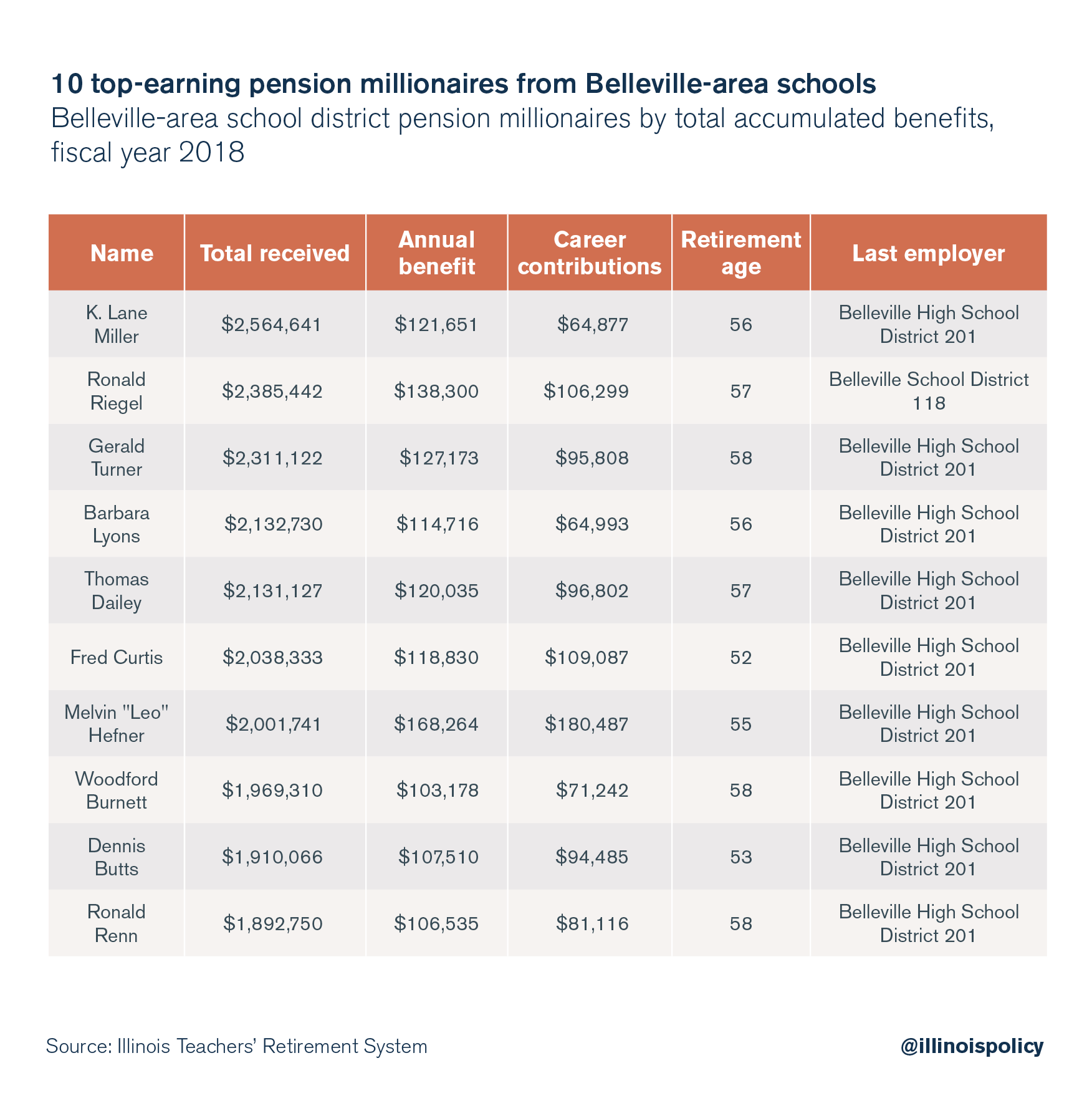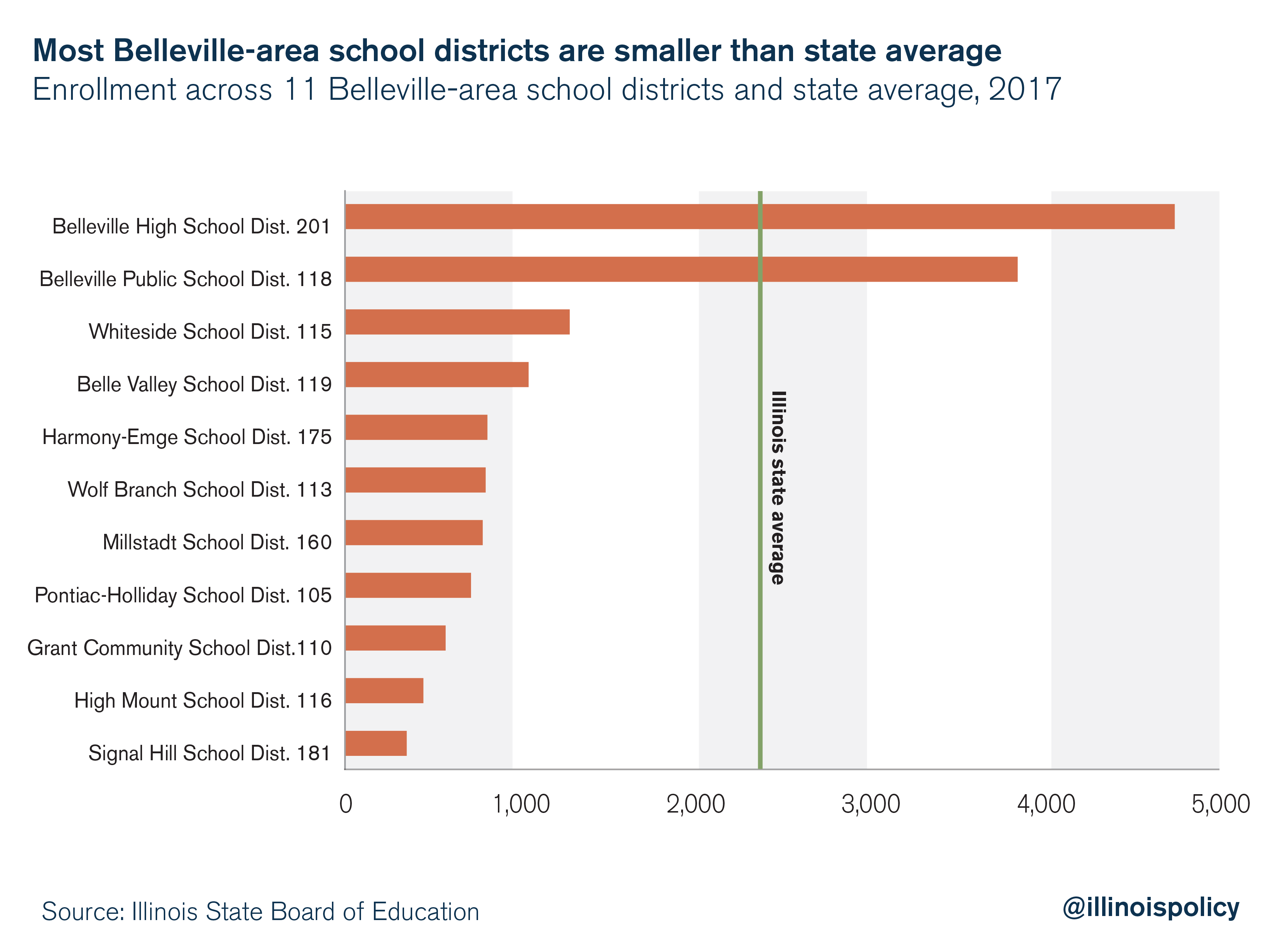More than 70 Belleville-area school retirees are pension millionaires
Pension payouts collected by the Belleville area’s top-earning school retirees underscore the need to reform Illinois’ unaffordable pension system.
Seventy-three retirees from Belleville-area school districts have collected more than $1 million since retiring, seven of whom have accumulated more than $2 million.
The 73 education pension millionaires contributed an average of $123,009 to Illinois’ Teachers’ Retirement System, or TRS, during their careers. Tax dollars and investment returns covered the rest.
The average pension millionaire from Belleville’s high school district and 10 elementary feeder districts retired at age 57, and receives an annual payout of $114,439. Those benefits eclipse Belleville’s median household income of $42,406. Two-thirds of the pension millionaires were formerly employed by Belleville High School District 201.
The highest-earning retiree is former Belleville high school superintendent K. Lane Miller, who has accumulated over $2.5 million in pension benefits since retiring at age 56. Among all 73 pension millionaires, Miller’s retirement benefits-to-contributions ratio is the most disproportionate. He contributed just $64,900 to TRS during his career – the fourth-lowest in the group.

Government retirees themselves do not deserve blame for TRS’ deficiencies – state lawmakers created the system. But equally important are the billions in tax dollars raised for state education spending during the past 20 years that have flowed disproportionately to pensions, rather than the classroom. More than a third of the state’s contribution to education funding is consumed by pensions, compared with just over 8 percent in the 1996 school year. Increasingly, pensions are elbowing the classroom out of the budget.
Among the state’s six largest pension systems, TRS pays the highest number of annual six-figure payouts, with nearly 12,000 former school district employees collecting more than $100,000 in benefits each year. The next closest is the State University Retirement System, which delivers six-figure payouts to nearly 4,300 pensioners each year.
Trapped in TRS
This system may work well for older TRS retirees who’ve collected millions in benefits, but younger teachers are already suffering. Since January 2011, new teachers have been forced to sacrifice a massive chunk of their paychecks under the “Tier 2” plan lawmakers introduced in an effort to bail out the indebted pension system.
TRS’ $73 billion debt accounts for the largest portion of the state’s combined $130 billion in pension debt. In October, TRS said it would need $400 million more from taxpayers in next year’s state budget than last. That would bring the total taxpayer contribution to $4.8 billion.
The cost of shoring up TRS at the expense of teacher and student needs is causing some to call for tax hikes, despite Illinois’ already high tax burden. In St. Clair County, where Belleville is located, property taxes have nearly doubled during the past 20 years – surpassing home values by more than 200 percent – with pensions being the main driver. To be clear, property tax dollars don’t flow directly to TRS. Rather, local school districts hike property tax levies to make up for the share of state education funding captured by teacher pensions.
Unsustainable growth
What causes expensive pension benefits? Expensive employee salaries, for one. In just the six school districts that cover the city of Belleville, more than 230 school district employees earn more than $100,000 a year. Because the state picks up the cost of local pensions, school districts are immune from the financial consequences of pensions. As a result, many administrators raise salaries dramatically for employees nearing retirement, an abusive practice known as “pension spiking.”
A 2005 law discouraged pension spiking by capping end-of-career salary increases to 6 percent for TRS participants. Employers could still increase salaries by more than that amount, but they pay a penalty to cover the cost of the amount spiked above the cap.
Unfortunately, this 6 percent limit encouraged many school districts to spike salaries right up to the cap. Others simply choose to pay the penalty: An Illinois News Network investigation in July found that Belleville school districts collectively paid about $67,800 in penalties for pension spiking, while the total for districts in St. Clair and Madison counties was $527,845.
A path to pension reform
One of the few bright spots of Illinois’ most recent budget was a provision reducing the pension spiking cap from 6 percent to 3 percent.
Local schools could also trim inflated pension costs by consolidating some of the 10 elementary districts that feed students into Belleville high schools. Only the high school district and Belleville elementary district have enrollments greater than the state average: Signal Hill serves only 348 students. Trimming the number of costly administrative salaries in the 11 school districts would reduce the number of overly generous retirement packages.

But Illinois remains in desperate need of reforms that address the inherent flaws of the state’s defined-benefit pension system.
Springfield has a moral obligation to government workers and Illinois taxpayers alike to amend the state constitution. An ideal constitutional amendment would protect already-earned pension benefits for government workers, while allowing for sensible adjustments to the growth in unearned benefits. Further, all government workers should have the option to participate in a 401(k)-style personal retirement account. More than 20,000 state university employees already choose that option.
Without meaningful reform, Illinois’ unsustainable pension system risks jeopardizing the retirement security of future government retirees, and threatens Illinoisans with endless tax hikes.